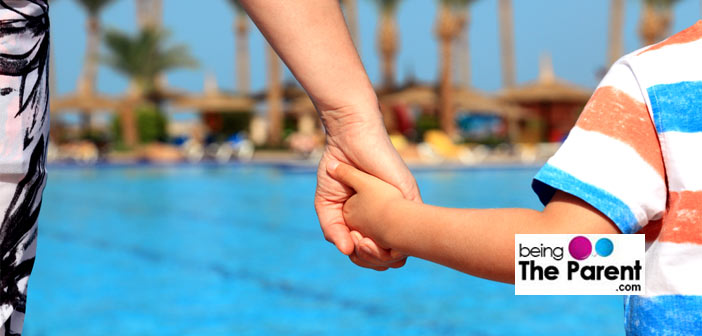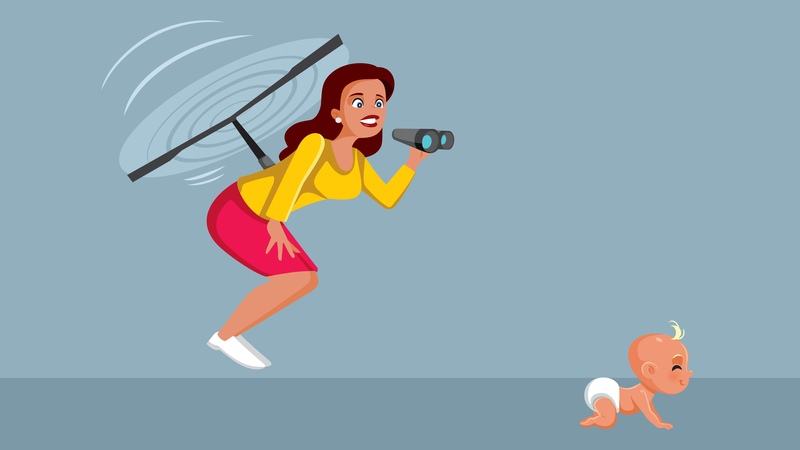Examples Of Helicopter Parenting
Priya selects the clothes her daughter Aadya has to wear daily. Aadya is five
Latha has been sitting outside her son’s preschool waiting to be called in to pacify her inconsolable son. He has been going to school for over 3 months now without crying. Latha still waits outside
Prateek loves taking his daughter Mia to the park. However, he never leaves her hand. Mia is 3. His wife, Meena still spoon-feeds their 5 year old
Khushboo calls her daughter’s school teacher almost every other day to complain about other kids who seem to be annoying her child
Parul helps her 10 year old complete all his school projects
Sounds familiar? You do this or you know parents who do this? Welcome to the fast emerging concept of helicopter parenting!
How Is Helicopter Parenting Defined?
Just like a helicopter hovers overhead, a helicopter parent is always hovering around his/her child, doing things for the child that the child is capable of doing alone, finishing the child’s chores, taking care of problems that the child is old enough to take care by himself/herself – in short, micromanaging every aspect of the child’s life. A helicopter parent is also called a cosseting parent or simply a cosseter. Helicopter parenting are parents who are “over-involved” in their child’s life, over-managing everything and being “over-them” all the time.
A helicopter parent “over-parents” or focuses too much on parenting. Such a parent takes too much responsibility for their children, their actions, their wins and losses, and tries to orchestrate the path forward for the child. Most of us do this to some extent. But a helicopter parent takes it a different level by being paranoid, insecure and overprotective about their child’s life and actions. Some other terms used to describe the same trait of parenting are – “lawnmower parenting”, “cosseting parent”, or “bulldoze parenting”.
Why Do Some Parents Become Helicopters?
Ok, we know that question sounds funny. But here are some of the main reasons why helicopter parenting is becoming prevalent.
- Anxiety: We as parents are always anxious – about our safety, happiness and their ability to cope with the world and this makes the parents anxious. Second guessing every move we make as parents, we project our fears into our children constantly being vigil about their lives
- Love: This heightened parental feeling is born out of love, no doubt. You love your child so much that you want him/her to know no pain and no struggle in life and wish to keep him out of harm’s way forever. But in the attempt, you tend to give excessive attention to your child’s life
- Information explosion: Thanks to internet and smart phones, a wealth of information on children’s upbringing is easily available to all. You have read so much about so many different topics that you want to intervene and “get it right” for your child every minute of the day
- Need for control: No matter what your child’s age is, you feel like he/she is still your “baby” and that you need to control his/her life
- Overcompensation: A parent who was not loved or showed affection enough as a child would try to overcompensate for this loss by smothering his/her child with more attention and care than the child requires
- Peer pressure: You see your neighbors and friends fussing over their kids for everything and you suddenly feel less of a parent. So you start following their footsteps too
- Changing world: And perhaps most importantly, the world is fast evolving and you know that the competition your child will face is much more than what you faced when you grew up. You are worried that if you let go off them, they won’t be able to find a place of their own in this wicked world

What Are The Negative Effects Of Helicopter Parenting?
But what is wrong with all this, you ask? They are so young, you say? If not you who else will do these things for them, you think?
Think again! Research clearly shows that being a helicopter parent can have detrimental effect on both you and your child. Here are some of the consequences:
- Kids get lesser physical exercise: If you hover around your child in park and play area all the time, they will not engage in spontaneous play, and hence will not get as much physical exercise as they should
- Kids get lesser mental exercise: Only when your child struggles to learn something will he learn it well. If you are providing your child too much guidance and help to, let’s say, finish a puzzle, then chances are he will never learn to solve puzzles on his own. Or worse, he will learn to give up on things, in the belief that others (like you) will take care of it
- You will curb your child’s independence: Whether you admit it or not, your child has pretty good judgment and decision making skills – and these are qualities that need to be nurtured. If you keep making your child’s decisions, then they will grow up into young adults who are overly dependent on their parents for everything. This will impact their self-esteem and confidence
- Kids get frustrated: As they grow older, they become more aware of things that they can do themselves. They also see that most of their friends do things alone, while their mom still insists on tying their shoe laces. This can frustrate any child!
- Your child will have un- or under-developed life skills: When you do all the chores for your child and run everything alone in and around your house, then your child is missing an amazing hands-on experience in how to run a family, home and personal life
- Your child might become spoilt: Another consequence is that your child will develop a sense of entitlement and expect everything to be served to him/her on a silver plate, which is neither feasible nor sustainable
- Your child will not develop problem-solving skills: If you intervene every tussle your child might have in the playground or in school, then he/she will not learn how to cop up with and solve problems
- You end up feeling discontent, anxious and worried all the time: When you are overthinking every decision you make for your child, you end up unhappy, discontent and unsure of the consequences of all the decisions that you have taken on your shoulders alone. You might also think that your spouse, who might not be a helicopter parent, is not doing ‘enough’ for the child, thereby causing rift in the marriage
What Can You Do to Stop Being a Helicopter Parent?
Now that we are all clear that helicopter parenting is NOT the way to go, let us see how you can get a grip and stop hovering. But before we go there, we want to reiterate that we know that you love your child so much and that is the reason for your fussiness around him/her. But let us understand one thing – worrying is not an expression of love. It feels like love. You would think that if you are not worried enough, you are being less of a parent. Let us assure you – this is not true. Now read on for tips to stop being a helicopter parent.
- Identify your child’s skills: Write down the things your child can do by himself/herself. If your child goes to a preschool, ask the teachers the things he/she does alone in school, like eating or going to loo. Make this list, and keep adding on to it as your child learns new things. This will prevent you from doing those things that he/she is developmentally capable of doing
- Practice playground ethics: Find some time when the playground is relatively empty and take your child there. Sit back and watch him/her play. Be around, but don’t hover. This will give you a chance to see how he/she carries himself/herself if you are not there to hold hands. Once you get the confidence that your child is capable of taking care of himself/herself in a playground, then you can always sit back and watch during their play time
- Let them fall and get up…by themselves: The biggest problem of being a helicopter parent is the inability to see your child suffer and struggle. But remember that you would not be around always to cushion their falls. Let them fall, fail and get disappointed. Not only will this better equip them for their lives ahead, it will also help them get up on their own and solve their problems
- Plan your day well: Often you become a helicopter parent by chance, not by choice. When you are running late in the morning and your child insists on you putting on his uniform shirt, it is easier (and faster) to just do it for him/her rather than say no and make him/her do it alone. But if you plan your day well in advance and tell your child what tasks you will do, and what tasks he/she needs to do in the morning, then your child will learn to be independent very fast
- Finally, be a submarine, not a helicopter: We are not saying you should let your 3 year old fend for himself in this world. You are a parent and you definitely need to engage your child. So rather than be a helicopter and hover around them 24×7, be a submarine – be close enough to help them if they are in danger but stay out of sight
Stop being obsessively protective about your kids, and let go of micromanaging their lives. In the long run, you will end up having adults who are unable to make any decisions on their own and would always depend on the parents.

